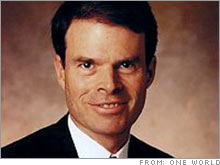Can Clearwire take on the big telcos?Despite a solid debut, Clearwire isn't out of the woods. But investors who have bet on Craig McCaw have come out on top before.NEW YORK (Fortune) -- In its debut as a public company Thursday Craig McCaw's Clearwire proved it was no Vonage (Charts): unlike its fellow telco provider, whose shares sank the day of its initial public offering - and kept sinking - Clearwire, which raised $600 million, saw its stock end the day pretty much where it started. But Clearwire (Charts) isn't out of the woods yet. The company, which offers wireless high-speed Internet access, still faces questions about its business. Clearwire is trying to make it as stand-alone broadband wireless operator at a time when competitors from AT&T (Charts) and Verizon (Charts) to Comcast (Charts) and Time Warner Cable (Charts) are bulking up to offer bundles of voice, video and data services.
Clearwire is trying to turn its relatively paltry menu of services into a virtue: "We offer our subscribers competitively priced services that combine speed, simplicity, portability and reliability," the company says in its IPO prospectus. "We believe that DSL, cable and cellular networks do not deliver all of these characteristics in a single service offering." Put another way, Clearwire seems to be positioning itself as an a la carte alternative to the telco and cable guys' bundled offerings. That sounds like a great niche strategy, but Clearwire seems to have grander ambitions. In addition to the $600 million it raised this week, the company secured $900 million from key suppliers Intel Corp. and Motorola last summer. The company believes it is the second-largest holder of broadband wireless spectrum in the United States, and it plans to build out networks covering much of the country. Clearwire, based in Kirkland, Wash., today offers fixed high-speed Internet and phone service in 34 U.S. markets and a handful of European locales. But the company says it is moving to adopt a technological standard known as mobile WiMax, which should allow customers to get superfast Internet connections - and phone calls - on the go. Mobile WiMax today is in its infancy - there's a deployment in perennial early adopter South Korea, for example - and while proponents say the standard will allow carriers to blanket a territory cheaply with robust broadband connections, there are skeptics. John Stankey, chief technology officer at AT&T, says the company spent two years testing WiMax, deploying six commercial trials to understand the technology better. The upshot: AT&T sees WiMax in the United States as a supplement, not a substitute, for existing broadband technologies like DSL. "We think we understand the limitations of WiMax," Stankey says. "WiMax is going to have its place, but it isn't going to supplant all other access technologies." Even if mobile WiMax is a huge success, Clearwire still faces stiff competition from AT&T and other operators selling one-stop bundles of communications and entertainment services. And bundles appear to be a hit with customers. Cox Communications has about 6 million customers: almost 60 percent buy at least two services from Cox, and more than 1 million customers get voice, video and broadband services from the cable operator. To be sure, McCaw has a good track record backing stand-alone wireless companies. In the 1980s he built McCaw Cellular into a successful nationwide wireless operator while competing against the deep-pocketed Bell operating companies. In the 1990s, he backed Nextel, another stand-alone wireless player that thrived by selling mostly to business customers, differentiating itself from a large pack of competitors. In the end, though, McCaw ended up seeking bigger partners: McCaw Cellular sold to AT&T, and Nextel merged with Sprint. That said, the companies sold for nice premiums. Clearwire investors might not mind if McCaw's latest venture met a similar fate. |
Sponsors
|

